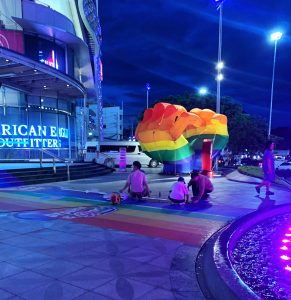In my second blog, I wrote about how this revolution is different than previous conflicts in Myanmar – that the military coup has actually created stronger opposition and more solidarity among the people. In that blog I highlighted the relationships and empathy built between the ethnic majority and ethnic minorities. While there is very little written about it, this also seems to be the case for the LGBTQ+ community and resistance groups.
Myanmar’s society is generally very conservative when it comes to gender and sexuality. These attitudes are attributed to Buddhism compounded with British colonial policies.
When I spoke with “Hom,” a young trans man and activist living in Southern Shan State (profiled in my last blog), about his experience as a queer person in Myanmar, he told me about his childhood nickname: “The one even the monks make ashamed.” The name hardly rolls off the tongue (at least not in English), which I find reflective of the extra lengths Hom’s community went to to humiliate him.
As a child, during the military regime in the early 2000s, Hom felt intensely uncomfortable in girl’s clothing, so he dressed as a boy and kept his hair short. In response, he told us that at every opportunity – community gatherings and village events – the monks and other authority figures would take time to call him out on the loudspeaker, telling everyone that Hom was wrong and unnatural and that the community should be ashamed of him.
During the democratic period in the 2010s, some progress was made regarding attitudes toward gender and sexuality, including allowing LGBTQ+ events and festivals, but little legislative progress was made (same-sex rape and rape of LGBTQ+ people are still not criminalized, for example). And since the 2021 coup, the military junta has once again demonized the LGBTQ+ community.
Hom faces discrimination on a daily basis. A couple weeks ago he went to the market to buy a whole pig. Knowing that Hom is biologically female and in a relationship with a woman, the people in the market asked if the pig was to be their child since they couldn’t have children on their own.
He also told me that when he has trouble lifting something heavy that one would expect a man to be capable of lifting, people ask if Hom is pregnant – both digging at his gender and relationship. He said they’re mostly framed as “jokes,” but the distress and hurt in Hom’s voice was clear as he told us these stories.
As Hom shared these stories of discrimination, he emphasized that others in the LGBTQ+ community have it much worse. He is grateful not to be in prison for his activism and not to be a trans woman because, he said, it is much more dangerous for them.

Many LGBTQ+ people have escaped to Thailand, the most LGBTQ-friendly country in SE Asia.
Chiang Mai celebrated Pride all of June, and Burmese queer couples used the opportunity to get married here as an act of resistance against the junta.
Ma Saw Han Nway Oo is a transgender activist and is among the 62% of LGBTQ+ activists arrested after protesting the coup. In this article she shares the horrors she went through as a trans woman in Mandalay’s notorious prisons, explaining how she was tortured and sexually assaulted when she refused to use masculine pronouns after her arrest.
Despite the egregious treatment at the hands of the guards, Saw Han Nway Oo says the other prisoners treated her “very kindly,” showing solidarity as they faced a common enemy and as they saw how much more danger she experienced.
This kind of solidarity and support for the LGBTQ+ cause has grown since the coup. The contribution of LGBTQ+ activists to the federal democracy movement and increased visibility of queer people putting their lives on the line for resistance groups has begun to shift attitudes.
A woman from rural central Myanmar is quoted in a Burma News International article saying, “in the rural areas people didn’t like LGBT before. Villagers thought that they were disgusting… that most people in same-sex relationships had AIDS. But when LGBT people joined the revolution, people started accepting them and working together with them. Now, they want to help them and encourage them.”
This attitude was even depicted in the film Lose and Hope that I watched at the beginning of my fellowship. In the film about young Karenni resistance fighters, one of the characters’ stereotypical gayness provides comic relief for both the audience and characters. But he is also portrayed as an excellent shooter and valuable resistance fighter. At the end of the film, his grief for his best friend’s death is not mocked or even depicted as unrequited love but is instead used to show how much more motivated he is to win the revolution.
Posted By Madeleine Schneider
Posted Jul 17th, 2024


4 Comments
Bobbi Fitzsimmons
July 19, 2024
Thank you for this post, Maddy. You have been trusted with these very personal stories and have been able to show t them in the larger picture of conflict and resistance. Perhaps it means that a common goal lessens the differences people sometimes create for no other reason than “difference.” It’s unfortunate that the Myanmar conflict had to be the catalyst for acceptance of LBGTQ+ individuals but I hope it will continue and last beyond the confllict.
Iain Guest
July 21, 2024
This is a very important blog, Maddy. Thank you for writing it. You’ve opened up a window on the conflict in Burma that has been largely closed up to now and seems to me to have profound implications for our understanding of conflict in general. At a very superficial level, you suggest that this repressive and homophobic Junta has hardened opposition among the LGBTQ population. That seems clear. But you also suggest that the Junta’s intolerance is also softening attitudes towards LGBTQ among Burmese society more generally, which tends to be very conservative. There’s a lot to ponder in this blog. Thank you!
Mary Ellen Cain
July 22, 2024
Thank you for this blog which gives more background on Hom’s transgender experience and also tells us how difficult it is for a trans woman prisoner. It’s good to see that the democracy movement has become more supportive of the LGBTQ community and hopefully this change of attitude will continue and grow when the conflict eventually abates.
Mary Ellen Cain
July 29, 2024
Thank you for posting this blog which gives more background on the LGBTQ challenges in Burma/Myanmar and surrounding countries. It is encouraging to see the shift in attitudes toward LGBTQ people, especially among the rural community members even though it took this terrible conflict to motivate the shift. Of course, there are still many uncertainties ahead, but hopefully the recent acceptance shown by their fellow prisoners and rebel fighters will bring about even more understanding from the broader society as time goes on.